In Focus This Week
Fostering Resilient Elections
A New Report on Strengthening Preparedness and Collaboration
By Andrea Byrne (Center for Tech and Civic Life Cybersecurity Advisor), Karen Brinson Bell (Advance Elections), Carolina Lopez (Partnership for Large Election Jurisdictions) and TJ Pyche (The Elections Group)
Emergencies don’t wait for ballots to be counted. Natural disasters, cyber incidents, and infrastructure failures can strike at any point in the election cycle, disrupting operations, jeopardizing voter access, and undermining public confidence.
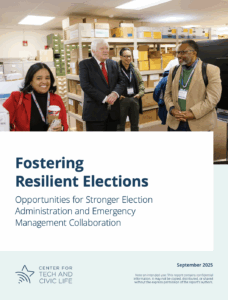 A new report from the Center for Tech and Civic Life, Fostering Resilient Elections: Opportunities for Stronger Election Administration and Emergency Management Collaboration, highlights how election officials and emergency managers can build stronger partnerships to safeguard elections in the face of disruption.
A new report from the Center for Tech and Civic Life, Fostering Resilient Elections: Opportunities for Stronger Election Administration and Emergency Management Collaboration, highlights how election officials and emergency managers can build stronger partnerships to safeguard elections in the face of disruption.
The report draws on extensive conversations with dozens of election officials and emergency managers from across the country. The perspectives shared come from officials who have managed elections and emergency response through hurricanes, wildfires, winter storms and security incidents.
Their collective experience underscores that collaboration between elections and emergency management is essential, but remains uneven across jurisdictions.
In some communities, election officials and emergency managers know each other well and maintain well-tested plans for navigating crises. In others, officials are still “trading business cards in the middle of a hurricane,” forced to improvise relationships and coordination at the worst possible moment.
This report argues that proactive engagement – building ties before an emergency strikes – can save time, reduce confusion, and protect both voters and the integrity of an election.
Key Recommendations
The report outlines practical opportunities for collaboration, such as integrating election officials into emergency communications systems, engaging in joint planning and tabletop exercises, and aligning financial preparedness with after-action reviews. At the same time, it acknowledges cultural and structural differences between the two fields – from divergent definitions of “mission critical” to conflicting timelines – that can complicate coordination.
The report offers the following recommendations for three key groups:
- Election officials should maintain regular contact with emergency management counterparts, participate in interagency planning and exercises, and document emergency communications, continuity, and response plans well ahead of each election. They should also assess election facilities and vendor relationships through a resilience lens and prepare financial documentation that allows for quick access to emergency resources.
- Emergency managers are encouraged to designate election liaisons before each election, integrate election-specific risks into their broader emergency plans, and include election officials in trainings and exercises. Their role in supporting continuity of election operations during crises is critical to ensuring election needs are prioritized alongside other essential services.
- Civil society can help by creating opportunities for relationship-building, cross-sector learning, and joint problem-solving. Developing training materials and model resources, providing technical assistance, and advocating for policy changes and resources will further strengthen the ability of election officials and emergency managers to withstand disruption.
Looking Ahead
Elections are zero-fail events, and emergencies that disrupt them can have consequences far beyond a single community. Building stronger ties between election officials and emergency managers is not just a matter of efficiency – it is a matter of protecting the right to vote, even in the face of disruption.
We encourage readers to explore the full report for detailed recommendations, case studies, and resources. By strengthening collaboration now, we can ensure that when the next emergency strikes, our elections are better protected.
electionline Daily News Email
 What’s the best part of waking up? electionline Daily News in your inbox of course so be sure to sign up for your daily dose.
What’s the best part of waking up? electionline Daily News in your inbox of course so be sure to sign up for your daily dose.
Each morning you’ll receive the top headlines of the day, plus a listing of states featured in that day’s news round up.
To sign up, simply visit our site and provide us with your email and you’ll begin receiving the news in your inbox each morning.
We Google so you don’t have to!
Election News This Week
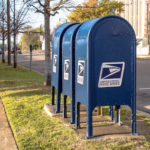 Mail Ballot Deadlines: Changes at the U.S. Postal Service are forcing people who rely on postmarks when voting to be extra careful when cutting it close to deadlines and elections officials from Maine to California have been beating the drum to get voters to submit their mail ballots as early as possible, especially rural voters. According to NPR, the Postal Service has proposed revising its mailing standards to say that postmark date “does not inherently or necessarily align” with the date that a mail piece was first accepted by a letter carrier or dropped off at a post office or collection box. “In other words, the date on a machine-applied postmark may reflect the date on which the mailpiece was first accepted by the Postal Service, but that is not definitively the case,” USPS said in a recent Federal Register notice. While Kansas currently has a three-day grace period for ballots to arrive–that will change in 2026–Secretary of State Scott Schwalb is encouraging voters to use drop boxes or vote in person. “Don’t give it to the federal government, especially in the government shutdown,” Schwab said, “it’s more important that you just use the drop boxes by the county election office and wherever else they are.” In California, where there are local elections and a statewide special election, everyone from the secretary of state to local elections officials have been encouraging voters to get their mail-in ballots back as quickly as possible. A U.S. Postal Service policy change that took effect in April could lead to delays in postmarking for California voters who live more than 50 miles from a regional hub, including in rural areas of Sacramento, San Joaquin, and Stanislaus counties. “In many parts of California, recent changes in the U.S. postal mail service mean your ballot may not be counted if you drop it off at a post office or a USPS mail box on election day,” Attorney General Rob Bonta said. “This is true for any community that is more than 50 miles from one of California’s six regional mail processing facilities.”
Mail Ballot Deadlines: Changes at the U.S. Postal Service are forcing people who rely on postmarks when voting to be extra careful when cutting it close to deadlines and elections officials from Maine to California have been beating the drum to get voters to submit their mail ballots as early as possible, especially rural voters. According to NPR, the Postal Service has proposed revising its mailing standards to say that postmark date “does not inherently or necessarily align” with the date that a mail piece was first accepted by a letter carrier or dropped off at a post office or collection box. “In other words, the date on a machine-applied postmark may reflect the date on which the mailpiece was first accepted by the Postal Service, but that is not definitively the case,” USPS said in a recent Federal Register notice. While Kansas currently has a three-day grace period for ballots to arrive–that will change in 2026–Secretary of State Scott Schwalb is encouraging voters to use drop boxes or vote in person. “Don’t give it to the federal government, especially in the government shutdown,” Schwab said, “it’s more important that you just use the drop boxes by the county election office and wherever else they are.” In California, where there are local elections and a statewide special election, everyone from the secretary of state to local elections officials have been encouraging voters to get their mail-in ballots back as quickly as possible. A U.S. Postal Service policy change that took effect in April could lead to delays in postmarking for California voters who live more than 50 miles from a regional hub, including in rural areas of Sacramento, San Joaquin, and Stanislaus counties. “In many parts of California, recent changes in the U.S. postal mail service mean your ballot may not be counted if you drop it off at a post office or a USPS mail box on election day,” Attorney General Rob Bonta said. “This is true for any community that is more than 50 miles from one of California’s six regional mail processing facilities.”
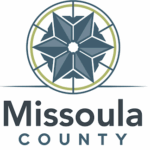 Mail Ballot Rejections: The Missoula County, Montana Elections Office has rejected an unusually high number of ballots due to their noncompliance with new state law, though the state says the issues are primarily in Missoula alone. Elections Administrator Bradly Seaman said his office has rejected nearly 170 ballots thus far due to their lack of a signature or birth year – both of which are now required on the outside of the return envelope. “It’s significant. We’ve been referring to it as a ten-times increase,” Seaman said. “We’ll contact voters and let them know they missed this. We’ve seen municipal races come down to a dead tie and we know every vote counts. We want to make sure voters are aware of it.” In response to the county’s concern, the Secretary of State’s office said nearly 80% of the ballots rejected statewide due to missing or non-matching information “appear to be from Missoula County.” “Missoula’s high rejection rate during this election shouldn’t be attributed to a new law, as it appears to be concentrated in Missoula County,” said Austin James, the Elections Director at the Secretary of State’s office. The Legislature this year passed HB 719, sponsored by Rep. Braxton Mitchell, a Flathead County Republican. The measure revised a number of voting laws and deemed a ballot to be void and not countable if not properly signed. “We direct a lot of that (complaints) to the bill’s sponsor and the Secretary of State,” Seaman said. “We’re working hard to let people know there’s a change to this envelope, and to know that it’s statewide and that it’s required.”
Mail Ballot Rejections: The Missoula County, Montana Elections Office has rejected an unusually high number of ballots due to their noncompliance with new state law, though the state says the issues are primarily in Missoula alone. Elections Administrator Bradly Seaman said his office has rejected nearly 170 ballots thus far due to their lack of a signature or birth year – both of which are now required on the outside of the return envelope. “It’s significant. We’ve been referring to it as a ten-times increase,” Seaman said. “We’ll contact voters and let them know they missed this. We’ve seen municipal races come down to a dead tie and we know every vote counts. We want to make sure voters are aware of it.” In response to the county’s concern, the Secretary of State’s office said nearly 80% of the ballots rejected statewide due to missing or non-matching information “appear to be from Missoula County.” “Missoula’s high rejection rate during this election shouldn’t be attributed to a new law, as it appears to be concentrated in Missoula County,” said Austin James, the Elections Director at the Secretary of State’s office. The Legislature this year passed HB 719, sponsored by Rep. Braxton Mitchell, a Flathead County Republican. The measure revised a number of voting laws and deemed a ballot to be void and not countable if not properly signed. “We direct a lot of that (complaints) to the bill’s sponsor and the Secretary of State,” Seaman said. “We’re working hard to let people know there’s a change to this envelope, and to know that it’s statewide and that it’s required.”
 New Citizens: Following recent rulemaking from USCIS prohibiting third party organizations, such as the League of Women Voters, from providing voter registration at naturalization ceremonies, the Rhode Island Board of Elections, is partnering with the Rhode Island Department of State and local boards of canvassers, to provide voter registration and voting information services to newly naturalized citizens following weekly naturalization ceremonies held at the U.S. Citizens and Immigration Service’s Johnston office. The Board of Elections will also join the Department of State at monthly naturalization ceremonies organized by the U.S. District Court. At tables set up outside of the naturalization ceremonies, elections officials will answer new citizens’ questions about elections in Rhode Island and assist in registering them to vote. “Naturalization ceremonies are joyous occasions for new citizens eager to contribute to and participate in our nation’s democracy,” Rhode Island Board of Elections Chairwoman Jennifer Johnson said in a media release. “There is nothing more fundamental to being a citizen than the right to vote,” Johnson said. “That is why the Board of Elections is proud to step up alongside the Department of State and local Boards of Canvassers to offer voter registration services and information about voting in Rhode Island elections to these newly naturalized U.S. citizens.”
New Citizens: Following recent rulemaking from USCIS prohibiting third party organizations, such as the League of Women Voters, from providing voter registration at naturalization ceremonies, the Rhode Island Board of Elections, is partnering with the Rhode Island Department of State and local boards of canvassers, to provide voter registration and voting information services to newly naturalized citizens following weekly naturalization ceremonies held at the U.S. Citizens and Immigration Service’s Johnston office. The Board of Elections will also join the Department of State at monthly naturalization ceremonies organized by the U.S. District Court. At tables set up outside of the naturalization ceremonies, elections officials will answer new citizens’ questions about elections in Rhode Island and assist in registering them to vote. “Naturalization ceremonies are joyous occasions for new citizens eager to contribute to and participate in our nation’s democracy,” Rhode Island Board of Elections Chairwoman Jennifer Johnson said in a media release. “There is nothing more fundamental to being a citizen than the right to vote,” Johnson said. “That is why the Board of Elections is proud to step up alongside the Department of State and local Boards of Canvassers to offer voter registration services and information about voting in Rhode Island elections to these newly naturalized U.S. citizens.”
 Sticker News: Shut the front door! This year’s Jefferson County, Colorado “I Voted” stickers will be scratch and sniff stickers. Yes, you read that right. “The I Voted sticker has always been a symbol of civic pride, but there’s also some nostalgia wrapped up in it that many voters remember from their childhood, and voting with a parent,” said Jefferson County Clerk and Recorder Amanda Gonzalez to FOX31. “Scratch ‘n’ sniff stickers have that same sense of nostalgia and fun and we thought it’d be a great opportunity to combine the two and bring that joy to voting.” The scratch-and-sniff stickers show a county ballot drop box along with an array of Colorado wild flowers. The clerk and recorder’s office said the community even voted from a selection of scented options to see which one “smelled the most like democracy.” “Voting should be something people look forward to. The scratch ‘n’ sniff sticker adds a bit of fun and celebration to the process—it’s a small way to make civic participation feel special. And if it brings more people out to vote, all the better,” said Gonzalez. The stickers
Sticker News: Shut the front door! This year’s Jefferson County, Colorado “I Voted” stickers will be scratch and sniff stickers. Yes, you read that right. “The I Voted sticker has always been a symbol of civic pride, but there’s also some nostalgia wrapped up in it that many voters remember from their childhood, and voting with a parent,” said Jefferson County Clerk and Recorder Amanda Gonzalez to FOX31. “Scratch ‘n’ sniff stickers have that same sense of nostalgia and fun and we thought it’d be a great opportunity to combine the two and bring that joy to voting.” The scratch-and-sniff stickers show a county ballot drop box along with an array of Colorado wild flowers. The clerk and recorder’s office said the community even voted from a selection of scented options to see which one “smelled the most like democracy.” “Voting should be something people look forward to. The scratch ‘n’ sniff sticker adds a bit of fun and celebration to the process—it’s a small way to make civic participation feel special. And if it brings more people out to vote, all the better,” said Gonzalez. The stickers  are only available in person at the seven polling centers in the county, which will open in phases starting Oct. 27, according to the clerk and recorder’s office. However, county voters who mailed in their ballots can still stop in to get a scratch-and-sniff sticker if they want one. “It smells like democracy,” Gonzalez said. Adrian F., an 11-year-old Chelsea, Massachusetts resident, has won the city’s “I Voted” sticker contest, which invited residents to submit original sticker designs to replace the traditional “I Voted” stickers handed out during the upcoming election on November 4, 2025. Participants were asked to create original, nonpartisan designs that prominently featured the words “I Voted.” Adrian’s sticker, which features a cheerful cat giving a thumbs up with the words “I Voted,” on it. “This design contest was created to encourage voter turnout and bring more attention to the local election,” said City Manager Fidel Maltez. “Adrian’s design captures the spirit of civic pride in a fun, relatable, and memorable way. We’re proud to showcase local creativity at our polling places and find creative ways to engage residents of all ages in the democratic process.” All submissions were reviewed by a panel of city officials, who selected a group of finalists based on creativity, originality, and alignment with the contest guidelines. The finalists’ designs were then posted online for a public vote, which received a total of 658 responses.
are only available in person at the seven polling centers in the county, which will open in phases starting Oct. 27, according to the clerk and recorder’s office. However, county voters who mailed in their ballots can still stop in to get a scratch-and-sniff sticker if they want one. “It smells like democracy,” Gonzalez said. Adrian F., an 11-year-old Chelsea, Massachusetts resident, has won the city’s “I Voted” sticker contest, which invited residents to submit original sticker designs to replace the traditional “I Voted” stickers handed out during the upcoming election on November 4, 2025. Participants were asked to create original, nonpartisan designs that prominently featured the words “I Voted.” Adrian’s sticker, which features a cheerful cat giving a thumbs up with the words “I Voted,” on it. “This design contest was created to encourage voter turnout and bring more attention to the local election,” said City Manager Fidel Maltez. “Adrian’s design captures the spirit of civic pride in a fun, relatable, and memorable way. We’re proud to showcase local creativity at our polling places and find creative ways to engage residents of all ages in the democratic process.” All submissions were reviewed by a panel of city officials, who selected a group of finalists based on creativity, originality, and alignment with the contest guidelines. The finalists’ designs were then posted online for a public vote, which received a total of 658 responses.
Personnel News: Daviess County, Kentucky Clerk Leslie McCarty has announced she’ll be seeking a third term in office. Telicia Lopez is the new San Bernardino city clerk. Victoria County, Texas Elections Administrator Margetta Hill has submitted her retirement notice.
New Research & Resources
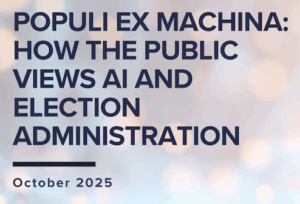 AI & Election Administration: Better Choices for Democracy has released a new report on how the public views AI and election administration. With input from local election officials, Better Choices for Democracy conducted a national survey of 1,633 U.S. adults (margin of error +/- 2.4% at 95% confidence interval) in October 2025 using AlphaRoc’s Occam platform to understand how the public views the use of AI in election administration, including which applications they find acceptable, how disclosure impacts confidence, and how sources of information impact confidence in election administration. The organization found that even if the public accepts AI use under certain conditions, confidence is strongly contingent on source, transparency, and visible human oversight.
AI & Election Administration: Better Choices for Democracy has released a new report on how the public views AI and election administration. With input from local election officials, Better Choices for Democracy conducted a national survey of 1,633 U.S. adults (margin of error +/- 2.4% at 95% confidence interval) in October 2025 using AlphaRoc’s Occam platform to understand how the public views the use of AI in election administration, including which applications they find acceptable, how disclosure impacts confidence, and how sources of information impact confidence in election administration. The organization found that even if the public accepts AI use under certain conditions, confidence is strongly contingent on source, transparency, and visible human oversight.
Key Findings:
- Americans approach the use of AI in election administration with tepid openness.
- Trust in election communication remains strongly tied to human sources and official channels, and the majority of Americans want clear labeling of AI-generated or AI-assisted content. About three-quarters of Americans say they are very or somewhat confident in information received directly from election officials, and a nearly identical 72% express confidence in information found on official election office websites. Confidence falls to about half for official chatbots and even lower for social media posts (38%).
- Attitudes toward AI in election administration vary sharply by age, gender, education, and partisanship. Younger, college-educated, and frequent AI users are more accepting of AI in administrative tasks like translation or answering voter questions, while older adults and infrequent users express greater skepticism.
- Across all groups, a majority say it is important for election offices to disclose when AI is used. However, disclosure alone does not necessarily increase trust. Roughly one-quarter of adults say disclosure would increase confidence in their local election officials, one-quarter say it would decrease confidence, and one-third say it would have no effect. Younger respondents and those with a college degree are more likely to report that disclosure would improve confidence, while older and less frequent AI users are more skeptical.
- Roughly one-third of adults report encountering false or misleading information about elections through AI tools. These experiences correlate with stronger views, both supportive and skeptical, about the use of AI in election administration.
- Overall, the findings suggest that while Americans see potential for AI to improve election administration, maintaining transparency, oversight, and human accountability is essential for sustaining public confidence.
Recommendations:
- Tailor education and engagement by demographic segment and start with low-risk, high-acceptability tasks. Because attitudes vary based on frequency of usage and demographics, election officials should tailor their rollout and education strategies to particular audiences. Older adults, less frequent AI users, and those wary of automation may need greater explanation, field demos, and trust-building outreach.
- Prioritize clear, consistent disclosure and branding. Labels, footers, disclosure pages, and public reports should emphasize human review, process transparency, and how to verify official status (e.g., logo/trust mark).
- Pair transparency with accountability. Disclosure is not enough on its own; governance, oversight, audits, and recourse mechanisms must accompany it to convert disclosure into trust.
- Address false and misleading information directly. Distinguish AI-assisted official sources from third-party tools, provide easy verification steps, and correct widely circulating AI-fueled errors proactively. Experience with false and misleading information when using AI tools deepens skepticism and shapes demand for protections. Managing confusability between official and non-official AI is critical.
By grounding adoption in public opinion, election officials can ensure that the use of AI reflects both administrative needs and democratic values, reinforcing voter trust in how elections are run and in the public servants who run elections.
Ballot Measures, Legislation & Rulemaking
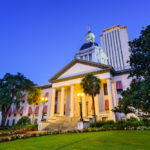 Florida: Sen. Tina Polsky (D- Boca Raton) is refiling a bill that proposes a statewide database to reduce legal uncertainty and assist individuals with certain felony convictions in restoring their voting rights. Polsky filed the revised measure (SB 132), which aims to streamline the process of restoring the voting rights of individuals with certain felony convictions, and help determine whether they’ve met the legal criteria for restoration under Florida law. Polsky filed an almost identical bill (SB 848) during the 2025 Legislative Session; however, the bill died during its passage through the Criminal Justice Committee. The Florida Commission on Offender Review would be required to develop and maintain a centralized, publicly accessible database that contains information for individuals disqualified from voting due to felony convictions, excluding individuals who have been convicted of murder or felony sexual offenses. The database would be required to contain information for individuals, including their name, and other identifying information. It would need to include information on outstanding restitution, fines, fees, and the remaining length of any term of supervision, such as probation, community control, or parole ordered by the court as part of his or her sentence.
Florida: Sen. Tina Polsky (D- Boca Raton) is refiling a bill that proposes a statewide database to reduce legal uncertainty and assist individuals with certain felony convictions in restoring their voting rights. Polsky filed the revised measure (SB 132), which aims to streamline the process of restoring the voting rights of individuals with certain felony convictions, and help determine whether they’ve met the legal criteria for restoration under Florida law. Polsky filed an almost identical bill (SB 848) during the 2025 Legislative Session; however, the bill died during its passage through the Criminal Justice Committee. The Florida Commission on Offender Review would be required to develop and maintain a centralized, publicly accessible database that contains information for individuals disqualified from voting due to felony convictions, excluding individuals who have been convicted of murder or felony sexual offenses. The database would be required to contain information for individuals, including their name, and other identifying information. It would need to include information on outstanding restitution, fines, fees, and the remaining length of any term of supervision, such as probation, community control, or parole ordered by the court as part of his or her sentence.
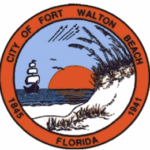 Fort Walton Beach, Florida: The Fort Walton Beach City Council voted 5-2 on October 14 to advance a referendum that would move city elections from March of odd years to November of even years, aligning with statewide general elections. The proposed charter amendment would establish the first Tuesday after the first Monday in November of each general election year as the date for mayor and city council races. The ordinance will come back for first and second readings before the ballot question can appear before voters in March 2026. Councilman David Schmidt, who made the motion to advance the proposal, argued that current low turnout creates voter fatigue. “I think a real voter fatigue is after they go through an exhausting nationwide campaign and turn around and they see a whole bunch more signs in January and February that have to do with another election that historically our record has been like 11% voter turnout,” he said. Under the proposal, seats one through four, elected in 2023, would next appear on the ballot Nov. 3, 2026, with terms beginning April 1, 2027. Seats five through seven and the mayor’s office, elected in 2025, would be on the Nov. 7, 2028 ballot, with terms starting April 1, 2029. On October 28, the proposed ordinance language will be brought back to council for approval. First reading will be at the November 18 meeting, followed by second reading on December 16. The change would require approval by a majority of voters to take effect.
Fort Walton Beach, Florida: The Fort Walton Beach City Council voted 5-2 on October 14 to advance a referendum that would move city elections from March of odd years to November of even years, aligning with statewide general elections. The proposed charter amendment would establish the first Tuesday after the first Monday in November of each general election year as the date for mayor and city council races. The ordinance will come back for first and second readings before the ballot question can appear before voters in March 2026. Councilman David Schmidt, who made the motion to advance the proposal, argued that current low turnout creates voter fatigue. “I think a real voter fatigue is after they go through an exhausting nationwide campaign and turn around and they see a whole bunch more signs in January and February that have to do with another election that historically our record has been like 11% voter turnout,” he said. Under the proposal, seats one through four, elected in 2023, would next appear on the ballot Nov. 3, 2026, with terms beginning April 1, 2027. Seats five through seven and the mayor’s office, elected in 2025, would be on the Nov. 7, 2028 ballot, with terms starting April 1, 2029. On October 28, the proposed ordinance language will be brought back to council for approval. First reading will be at the November 18 meeting, followed by second reading on December 16. The change would require approval by a majority of voters to take effect.
 Georgia State Board of Elections: The Georgia State Board of Elections voted 3-2 this week to recommend the Legislature ban no-excuse absentee voting. Board member Janice Johnston, a GOP appointee who introduced the recommendation, said that absentee voting “should be the exception rather than the rule,” arguing that it poses a higher risk of voter fraud. She also argued that Georgia’s three-week early voting period makes absentee voting unnecessary. Board Chair John Fervier vehemently opposed the recommendation, arguing that restrictions on absentee ballot access would place an unnecessary burden on voters, particularly low-income voters. “There are a lot of people out there that work seven days a week to feed their families, make ends meet — especially now — and restricting their access to absentee voting is not fair to those people,” Fervier said. “When you have to earn a dollar every day to feed your family, you can’t take a day off to go vote,” he added. Sara Tindall Ghazal, the only Democratic member of the board, also opposed the proposal, arguing that there wasn’t a clear reason to change the law and noting that absentee ballots only account for a small percentage of votes cast in Georgia. During the 2024 election, roughly 5% of voters cast an absentee ballot. The board also voted 3-1 to recommend that the Legislature limit the amount of time overseas and military voters have to return absentee ballots. The board also voted 2-0 to begin the rulemaking process for a bipartisan proposal that aims to clarify the circumstances under which voters can use paper ballots rather than ballot-marking devices.
Georgia State Board of Elections: The Georgia State Board of Elections voted 3-2 this week to recommend the Legislature ban no-excuse absentee voting. Board member Janice Johnston, a GOP appointee who introduced the recommendation, said that absentee voting “should be the exception rather than the rule,” arguing that it poses a higher risk of voter fraud. She also argued that Georgia’s three-week early voting period makes absentee voting unnecessary. Board Chair John Fervier vehemently opposed the recommendation, arguing that restrictions on absentee ballot access would place an unnecessary burden on voters, particularly low-income voters. “There are a lot of people out there that work seven days a week to feed their families, make ends meet — especially now — and restricting their access to absentee voting is not fair to those people,” Fervier said. “When you have to earn a dollar every day to feed your family, you can’t take a day off to go vote,” he added. Sara Tindall Ghazal, the only Democratic member of the board, also opposed the proposal, arguing that there wasn’t a clear reason to change the law and noting that absentee ballots only account for a small percentage of votes cast in Georgia. During the 2024 election, roughly 5% of voters cast an absentee ballot. The board also voted 3-1 to recommend that the Legislature limit the amount of time overseas and military voters have to return absentee ballots. The board also voted 2-0 to begin the rulemaking process for a bipartisan proposal that aims to clarify the circumstances under which voters can use paper ballots rather than ballot-marking devices.
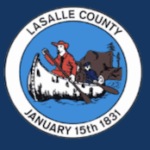 LaSalle County, Illinois: La Salle County election judges might not be getting a pay raise, after all. Don Jensen, chairman of the La Salle County Board, circulated an email Thursday advising board members that he would not sign the recently enacted increase in compensation for election judges. “I’m all about fair and well-run elections,” Jensen said, “but I think that pay increase is excessive.” The proposed increase was from $185 to $300, a jump of 62.2%. The county board adopted the raise on Oct. 9 by a vote of 16-11. Despite the majority vote, Jensen cited board rules giving him the authority not to sign the ordinance. “I believe the pay increase is not appropriate, it being a 62.2% increase and by the information given by the County Clerk, that level of pay is not necessary to attract people to fill the spots,” Jensen told board members via email. “The goal of having adequate numbers of election judges to run the polls to ensure fair, well-run elections should also be considered along with the cost to the taxpayers.” Jensen said the ordinance would be brought back to the full board on Nov. 3 for reconsideration. County Clerk Jennifer Ebner issued a brief statement when asked for comment. “Per advice from the (La Salle County) States Attorney’s Office, this is a valid course of action the county board chairman can take.”
LaSalle County, Illinois: La Salle County election judges might not be getting a pay raise, after all. Don Jensen, chairman of the La Salle County Board, circulated an email Thursday advising board members that he would not sign the recently enacted increase in compensation for election judges. “I’m all about fair and well-run elections,” Jensen said, “but I think that pay increase is excessive.” The proposed increase was from $185 to $300, a jump of 62.2%. The county board adopted the raise on Oct. 9 by a vote of 16-11. Despite the majority vote, Jensen cited board rules giving him the authority not to sign the ordinance. “I believe the pay increase is not appropriate, it being a 62.2% increase and by the information given by the County Clerk, that level of pay is not necessary to attract people to fill the spots,” Jensen told board members via email. “The goal of having adequate numbers of election judges to run the polls to ensure fair, well-run elections should also be considered along with the cost to the taxpayers.” Jensen said the ordinance would be brought back to the full board on Nov. 3 for reconsideration. County Clerk Jennifer Ebner issued a brief statement when asked for comment. “Per advice from the (La Salle County) States Attorney’s Office, this is a valid course of action the county board chairman can take.”
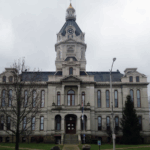 Parke County, Indiana: Parke County Commissioners approved a request by the Parke County Election Board to go to vote centers and keep all nine vote centers open to voters. The decision, which was unanimous, came on the heels of discussions to possibly eliminate polling places at Tangier, Lyford and Bridgeton. “We want everyone to have access, and that’s why this is so important now. People have the same access they have always have, and now they have more and can go anyplace to vote. If they are working someplace and didn’t have a chance to go vote at 6 in the morning, now they can go vote on their lunch or whatever. I think it will open up for more people to vote anyway. The whole idea is to make it easier on people to get more people out,” Commissioner Jim Meece said. Nicole Collings, Parke County Clerk, told the commissioners that after an election or two, they will re-examine the vote center idea, but for now, there will be nine vote centers.
Parke County, Indiana: Parke County Commissioners approved a request by the Parke County Election Board to go to vote centers and keep all nine vote centers open to voters. The decision, which was unanimous, came on the heels of discussions to possibly eliminate polling places at Tangier, Lyford and Bridgeton. “We want everyone to have access, and that’s why this is so important now. People have the same access they have always have, and now they have more and can go anyplace to vote. If they are working someplace and didn’t have a chance to go vote at 6 in the morning, now they can go vote on their lunch or whatever. I think it will open up for more people to vote anyway. The whole idea is to make it easier on people to get more people out,” Commissioner Jim Meece said. Nicole Collings, Parke County Clerk, told the commissioners that after an election or two, they will re-examine the vote center idea, but for now, there will be nine vote centers.
 Louisiana: Gov. Jeff Landry has summoned the Louisiana Legislature for a three-week special session starting this week to address next year’s election plans. The special session will begin Thursday, Oct. 23, and end no later than Nov. 13. Lawmakers will be allowed to file bills related to “election code, election dates, election deadlines, and election plans for the 2026 election cycle” and funding bills related to those items. The governor’s call is broadly written and could allow for a wide variety of election bills. Senate President Cameron Henry, R-Metairie, said that the governor told him that Landry’s priorities are to move back qualifying deadlines for next fall’s election to give the state an opportunity to react to a U.S. Supreme Court’s ruling expected sometime next spring. Justices heard arguments last week in Callais v. Louisiana, a decision that could require or allow the adoption of new congressional maps. Henry said no new maps would be drawn in this session.
Louisiana: Gov. Jeff Landry has summoned the Louisiana Legislature for a three-week special session starting this week to address next year’s election plans. The special session will begin Thursday, Oct. 23, and end no later than Nov. 13. Lawmakers will be allowed to file bills related to “election code, election dates, election deadlines, and election plans for the 2026 election cycle” and funding bills related to those items. The governor’s call is broadly written and could allow for a wide variety of election bills. Senate President Cameron Henry, R-Metairie, said that the governor told him that Landry’s priorities are to move back qualifying deadlines for next fall’s election to give the state an opportunity to react to a U.S. Supreme Court’s ruling expected sometime next spring. Justices heard arguments last week in Callais v. Louisiana, a decision that could require or allow the adoption of new congressional maps. Henry said no new maps would be drawn in this session.
 Ohio: Republican lawmakers have introduced legislation that would restrict the mail-in deadline, requiring all absentee ballots to be received by elections officials by the time polls close. Some veterans raised concerns that this could prevent military and overseas ballots from being counted. Right now, ballots will still be counted when returned within four days of the election, as long as they are postmarked by Election Day. In 2023, a massive election overhaul bill changed the deadline from the seventh day after the election to the fourth. But state lawmakers want to change that. “We want to make sure that something as precious as your vote is being done accurately and that our voters know we’re doing things correctly,” state Sen. Theresa Gavarone, R-Bowling Green, said. Gavarone and state Sen. Andrew Brenner, R-Delaware, introduced Senate Bill 293, requiring all ballots to be returned by the close of polls on election night. Gavarone said that sometimes ballots are received without being postmarked, so they may not be counted. “Your ballot has to be received on election day, on or before, so that there won’t be any ambiguity,” Gavarone said. Brenner said that he had been working with Secretary of State Frank LaRose and his team on the bill. Veterans argue that this could disenfranchise anyone voting by mail, especially military personnel. According to state data, about 17,000 of the more than one million Ohioans who voted by mail in 2024’s presidential election were military. Overall, nearly 10,000 ballots came in during the four days after the election.
Ohio: Republican lawmakers have introduced legislation that would restrict the mail-in deadline, requiring all absentee ballots to be received by elections officials by the time polls close. Some veterans raised concerns that this could prevent military and overseas ballots from being counted. Right now, ballots will still be counted when returned within four days of the election, as long as they are postmarked by Election Day. In 2023, a massive election overhaul bill changed the deadline from the seventh day after the election to the fourth. But state lawmakers want to change that. “We want to make sure that something as precious as your vote is being done accurately and that our voters know we’re doing things correctly,” state Sen. Theresa Gavarone, R-Bowling Green, said. Gavarone and state Sen. Andrew Brenner, R-Delaware, introduced Senate Bill 293, requiring all ballots to be returned by the close of polls on election night. Gavarone said that sometimes ballots are received without being postmarked, so they may not be counted. “Your ballot has to be received on election day, on or before, so that there won’t be any ambiguity,” Gavarone said. Brenner said that he had been working with Secretary of State Frank LaRose and his team on the bill. Veterans argue that this could disenfranchise anyone voting by mail, especially military personnel. According to state data, about 17,000 of the more than one million Ohioans who voted by mail in 2024’s presidential election were military. Overall, nearly 10,000 ballots came in during the four days after the election.
 Wyoming: Four bills seeking to catch and prevent election botching in Wyoming are headed into the 2026 legislative session after the Management Audit Committee advanced them all this week. The first bill committee members advanced would increase the $100 potential maximum fine for defying a legislative subpoena to $750, which is a more common figure associated with six-month misdemeanors across state law. The nine committee members present voted in favor of that. The second bill would specify that submitting a false post-election audit to the Wyoming Secretary of State’s Office is a felony punishable by up to five years in prison and up to $10,000 in fines. The third bill would layer transparency onto the post-election audit process, requiring the county clerk to notify the county chairman of each political party represented on the ballot, and a representative of all independent candidates of the time and place of the audit. It would require two or more electors of that county, from different political parties, to attend and observe the audit and its results. In Wyoming, electors of a county and/or the county commissioners may submit a complaint to the governor, asking the governor to remove a county official from office, state law says. The fourth bill the committee advanced would make the secretary of state a valid complainant when the alleged misconduct is an election offense.
Wyoming: Four bills seeking to catch and prevent election botching in Wyoming are headed into the 2026 legislative session after the Management Audit Committee advanced them all this week. The first bill committee members advanced would increase the $100 potential maximum fine for defying a legislative subpoena to $750, which is a more common figure associated with six-month misdemeanors across state law. The nine committee members present voted in favor of that. The second bill would specify that submitting a false post-election audit to the Wyoming Secretary of State’s Office is a felony punishable by up to five years in prison and up to $10,000 in fines. The third bill would layer transparency onto the post-election audit process, requiring the county clerk to notify the county chairman of each political party represented on the ballot, and a representative of all independent candidates of the time and place of the audit. It would require two or more electors of that county, from different political parties, to attend and observe the audit and its results. In Wyoming, electors of a county and/or the county commissioners may submit a complaint to the governor, asking the governor to remove a county official from office, state law says. The fourth bill the committee advanced would make the secretary of state a valid complainant when the alleged misconduct is an election offense.
Legal Updates
 Federal Litigation: According to Reuters, Newsmax Media said that it is in talks to settle a lawsuit over nearly half a million dollars in legal fees the right-leaning news outlet allegedly failed to pay its lawyers in a defamation case brought by a voting machine company after the 2020 U.S. presidential election. U.S. District Judge Brian Murphy in Boston on October 16 put the lawsuit brought by law firm Todd & Weld on hold for 30 days after Newsmax and Todd & Weld said, pausing the case would “facilitate ongoing settlement discussions.” Newsmax said in a statement it “has paid Todd & Weld close to 95% of all bills invoiced but we are disputing Howard Cooper’s billing and performance on several matters.” Cooper is a founding partner at Todd & Weld. A spokesperson for Boston-based Todd & Weld did not immediately respond to request for comment. Todd & Weld sued Newsmax last month, alleging that the company still owes more than $426,000 for its work defending Newsmax in a $1.6 billion defamation lawsuit brought by Dominion Voting Systems. The law firm alleged that Newsmax “acknowledges” the firm is owed fees but “simply refuses to pay.”
Federal Litigation: According to Reuters, Newsmax Media said that it is in talks to settle a lawsuit over nearly half a million dollars in legal fees the right-leaning news outlet allegedly failed to pay its lawyers in a defamation case brought by a voting machine company after the 2020 U.S. presidential election. U.S. District Judge Brian Murphy in Boston on October 16 put the lawsuit brought by law firm Todd & Weld on hold for 30 days after Newsmax and Todd & Weld said, pausing the case would “facilitate ongoing settlement discussions.” Newsmax said in a statement it “has paid Todd & Weld close to 95% of all bills invoiced but we are disputing Howard Cooper’s billing and performance on several matters.” Cooper is a founding partner at Todd & Weld. A spokesperson for Boston-based Todd & Weld did not immediately respond to request for comment. Todd & Weld sued Newsmax last month, alleging that the company still owes more than $426,000 for its work defending Newsmax in a $1.6 billion defamation lawsuit brought by Dominion Voting Systems. The law firm alleged that Newsmax “acknowledges” the firm is owed fees but “simply refuses to pay.”
 Arizona: The Arizona Supreme Court says the biennial election rulebook that tells local elections officials how to implement state law doesn’t have to follow the standard rule-making process, reversing an appellate ruling that possibly invalidated the rulebook created in advance of the 2024 election. The Court issued an order late last week, reversing a March decision from the Arizona Court of Appeals which ruled that Secretary of State Adrian Fontes violated the Arizona Administrative Procedures Act when he didn’t allow enough time for public comment on the 2023 Election Procedures Manual. “I am relieved and gratified by today’s decision,” Fontes said in a statement. “The rule of law has prevailed. The Court’s unanimous order confirms what every Secretary of State, Republican and Democrat alike, has always understood: the Legislature created a distinct process for adopting the Elections Procedures Manual, and that process stands apart from the Administrative Procedures Act.” The 2023 manual, as well as the 2025 version — which is not yet finalized — have both been heavily criticized by Republicans, who take issue with multiple guidelines and rules added by Fontes, a Democrat. Fontes deleted some portions of the 2023 EPM from the new version in response to other court cases that challenged or blocked those provisions. In February 2024, the Republican National Committee sued, joined by the state and Yavapai County branches of the party, alleging that the 2023 EPM was “designed to undermine election integrity in Arizona.” In May 2024, a trial court dismissed the RNC’s arguments that Fontes violated the Administrative Procedures Act in creating the 2023 EPM by allowing only 15 days for public comment instead of 30, concluding that the Administrative Procedures Act didn’t apply to the EPM. The RNC appealed that decision. In March, the Arizona Court of Appeals overturned the trial court’s decision. The Arizona Supreme Court issued a short, two-page order overturning that appellate decision and sending the case back to the appeals court to determine whether any of the eight specific EPM provisions that the RNC challenged in the suit violate state law.
Arizona: The Arizona Supreme Court says the biennial election rulebook that tells local elections officials how to implement state law doesn’t have to follow the standard rule-making process, reversing an appellate ruling that possibly invalidated the rulebook created in advance of the 2024 election. The Court issued an order late last week, reversing a March decision from the Arizona Court of Appeals which ruled that Secretary of State Adrian Fontes violated the Arizona Administrative Procedures Act when he didn’t allow enough time for public comment on the 2023 Election Procedures Manual. “I am relieved and gratified by today’s decision,” Fontes said in a statement. “The rule of law has prevailed. The Court’s unanimous order confirms what every Secretary of State, Republican and Democrat alike, has always understood: the Legislature created a distinct process for adopting the Elections Procedures Manual, and that process stands apart from the Administrative Procedures Act.” The 2023 manual, as well as the 2025 version — which is not yet finalized — have both been heavily criticized by Republicans, who take issue with multiple guidelines and rules added by Fontes, a Democrat. Fontes deleted some portions of the 2023 EPM from the new version in response to other court cases that challenged or blocked those provisions. In February 2024, the Republican National Committee sued, joined by the state and Yavapai County branches of the party, alleging that the 2023 EPM was “designed to undermine election integrity in Arizona.” In May 2024, a trial court dismissed the RNC’s arguments that Fontes violated the Administrative Procedures Act in creating the 2023 EPM by allowing only 15 days for public comment instead of 30, concluding that the Administrative Procedures Act didn’t apply to the EPM. The RNC appealed that decision. In March, the Arizona Court of Appeals overturned the trial court’s decision. The Arizona Supreme Court issued a short, two-page order overturning that appellate decision and sending the case back to the appeals court to determine whether any of the eight specific EPM provisions that the RNC challenged in the suit violate state law.
Maricopa County Recorder Justin Heap is asking a judge to stop an audit of the county’s election system after it was authorized by the Board of Supervisors. The Board of Supervisors, a five-member elected panel led by four Republicans, has been planning to contract a third-party vendor to conduct a systemwide assessment of election infrastructure. However, Heap believes the board is overstepping its authority and filed a request for a temporary restraining order to stop the audit last week. The judge responded to the filing on Friday by setting an evidentiary hearing for Nov. 6, when each side will have 45 minutes to make its case. When it comes to the audit, Heap said he wasn’t involved in the process to select a vendor and has concerns about giving third-party auditors access to sensitive information about Maricopa County’s 2.6 million registered voters.
 Arkansas: The Democratic Party of Arkansas filed a lawsuit against the governor this week seeking an earlier date for the House District 70 special election. The HD 70 seat became vacant last month after North Little Rock Republican Rep. Carlton Wing resigned to become the new executive director and CEO of Arkansas PBS. On Oct. 10, Gov. Sarah Huckabee Sanders scheduled special primary and general elections for March 3 and June 9, 2026, respectively, to select a new representative for the district, which includes portions of Pulaski County. The dates are the same as the Senate District 26 special election, which is being challenged in a separate lawsuit. A Pulaski County circuit judge who held a hearing in that case last week said she would rule quickly. Sam Dubke, a Sanders spokesperson, issued a statement saying the governor, in consultation with election officials, “decided that lining up the District 70 special election with the District 26 special election is just common sense, saves taxpayer dollars, and ensures the election is free, fair, and secure.”
Arkansas: The Democratic Party of Arkansas filed a lawsuit against the governor this week seeking an earlier date for the House District 70 special election. The HD 70 seat became vacant last month after North Little Rock Republican Rep. Carlton Wing resigned to become the new executive director and CEO of Arkansas PBS. On Oct. 10, Gov. Sarah Huckabee Sanders scheduled special primary and general elections for March 3 and June 9, 2026, respectively, to select a new representative for the district, which includes portions of Pulaski County. The dates are the same as the Senate District 26 special election, which is being challenged in a separate lawsuit. A Pulaski County circuit judge who held a hearing in that case last week said she would rule quickly. Sam Dubke, a Sanders spokesperson, issued a statement saying the governor, in consultation with election officials, “decided that lining up the District 70 special election with the District 26 special election is just common sense, saves taxpayer dollars, and ensures the election is free, fair, and secure.”
Pulaski County Judge Patricia James ruled in favor of a Franklin County resident and said a June 2026 special election to fill a vacant state Senate seat unconstitutionally deprives voters of a voice in next year’s legislative session. James’ eight-page ruling orders the state to hold the election “as soon as practicable” after the legal limit of 150 days from the vacancy to ensure that the date for the special election “will not infringe upon or curtail the constitutional and fundamental rights of the citizens of Arkansas Senate District 26.” Attorney General Tim Griffin and Gov. Sarah Huckabee Sanders said through spokespersons that they plan to appeal. James’ ruling stems from a lawsuit filed by Colt Shelby of Cecil against Sanders and Secretary of State Cole Jester over Sanders’ decision last month to schedule a special election in the district after the death of Republican Sen. Gary Stubblefield of Branch. Sanders originally set the election for Nov. 13, but after bipartisan pushback she revised the general election date to June 9, 2026. That date would still occur after the end of the fiscal session, set to begin April 8 and end May 7. State law requires that special elections to fill legislative vacancies be held no later than 150 days after the vacancy, unless it is “impracticable or unduly burdensome” to do so. James said in her ruling that setting the dates in June, after multiple county election officials testified that earlier dates were possible, amounted to “an infringement of a constitutional right based on the fundamental democratic principle of ‘no taxation without representation.’”
 California: A three-judge California 4th District Court of Appeals panel heard arguments this week in Huntington Beach’s voter ID case. The state of California, as well as Huntington Beach resident Mark Bixby, are trying to overturn a ruling made in April by an Orange County Superior Court judge who determined the city would be within its right to require voter identification in municipal elections. Oral arguments in both related cases were heard in back-to-back hearings this week. Huntington Beach voters in a March 2024 special election passed Measure A, adding into the city’s charter that officials “may” institute those requirements beginning in 2026. Earlier this year, O.C. Superior Court Judge Nico Dourbetas ruled that a voter ID requirement would not compromise the integrity of a local election. California Deputy Atty. Gen. Michael Cohen, arguing on behalf of the state, noted state election policy has traditionally out ruled local control. He added that with the charter amendment, Huntington Beach could require its residents to vote twice, at two different locations, on Election Day. John Howard, outside counsel representing Huntington Beach added that the state’s lawsuit was premature, given that Huntington Beach has not yet propagated any new election rules via a follow-up ordinance.
California: A three-judge California 4th District Court of Appeals panel heard arguments this week in Huntington Beach’s voter ID case. The state of California, as well as Huntington Beach resident Mark Bixby, are trying to overturn a ruling made in April by an Orange County Superior Court judge who determined the city would be within its right to require voter identification in municipal elections. Oral arguments in both related cases were heard in back-to-back hearings this week. Huntington Beach voters in a March 2024 special election passed Measure A, adding into the city’s charter that officials “may” institute those requirements beginning in 2026. Earlier this year, O.C. Superior Court Judge Nico Dourbetas ruled that a voter ID requirement would not compromise the integrity of a local election. California Deputy Atty. Gen. Michael Cohen, arguing on behalf of the state, noted state election policy has traditionally out ruled local control. He added that with the charter amendment, Huntington Beach could require its residents to vote twice, at two different locations, on Election Day. John Howard, outside counsel representing Huntington Beach added that the state’s lawsuit was premature, given that Huntington Beach has not yet propagated any new election rules via a follow-up ordinance.
 Colorado: Elizabeth Ann Davis, 61, of Castle Rock could be sentenced to three years in prison after she was convicted of voter fraud this week, prosecutors say. The 23rd Judicial District Attorney’s Office says Davis faced a jury, which found her guilty on two counts of forgery and one count of “personating an elector.” Prosecutors say that in 2022, Davis cast a ballot in her dead ex-husband’s name and also cast a ballot for her son. “Voter fraud threatens the core of our democracy. There must be consequences for those who break that trust,” Deputy District Attorney Chase Helseth said in a press release. The district attorney’s office says Davis is scheduled to be sentenced on Jan. 9, 2026. Prosecutors say she could face penalties ranging from probation to three years in prison.
Colorado: Elizabeth Ann Davis, 61, of Castle Rock could be sentenced to three years in prison after she was convicted of voter fraud this week, prosecutors say. The 23rd Judicial District Attorney’s Office says Davis faced a jury, which found her guilty on two counts of forgery and one count of “personating an elector.” Prosecutors say that in 2022, Davis cast a ballot in her dead ex-husband’s name and also cast a ballot for her son. “Voter fraud threatens the core of our democracy. There must be consequences for those who break that trust,” Deputy District Attorney Chase Helseth said in a press release. The district attorney’s office says Davis is scheduled to be sentenced on Jan. 9, 2026. Prosecutors say she could face penalties ranging from probation to three years in prison.
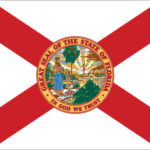 Florida: Last week, the U.S. Supreme Court rejected a petition from a Sarasota resident who challenged Florida’s closed primary election system. Michael J. Polelle is a former attorney and emeritus professor at the University of Illinois Chicago School of Law. An independent voter, he was upset after moving to Sarasota in 2012 and learning that as a nonparty-affiliated (NPA) voter, he was shut out of county commission primaries because of the state’s closed system. Without the aid of a law firm but with assistance from some of the legal contacts he’s maintained in Chicago, he filed a lawsuit in 2022 in the U.S. Middle District Court of Florida challenging the state’s ban on open primaries, saying it violates his rights under the First Amendment and Equal Protection Clause to political free speech and association. Florida Secretary of State Cord Byrd and Sarasota County Supervisor of Elections Ron Turner were listed as defendants. U.S. District Judge Steven D. Merryday dismissed the case in November 2022, ruling that Polelle lacked standing and had failed to state a claim for relief. Merryday also found that Florida’s interest in preventing unaffiliated voters’ potential to undermine a political party’s candidate-selection process outweighed his desire to vote in a partisan primary election, especially given the minimal burdens that Florida law imposes on voters who wish to join or switch political parties. He then filed an appeal last year with the U.S. Circuit Court of Appeals for the Eleventh Circuit. In an 112-page ruling released in March, a three-judge panel rejected his arguments.
Florida: Last week, the U.S. Supreme Court rejected a petition from a Sarasota resident who challenged Florida’s closed primary election system. Michael J. Polelle is a former attorney and emeritus professor at the University of Illinois Chicago School of Law. An independent voter, he was upset after moving to Sarasota in 2012 and learning that as a nonparty-affiliated (NPA) voter, he was shut out of county commission primaries because of the state’s closed system. Without the aid of a law firm but with assistance from some of the legal contacts he’s maintained in Chicago, he filed a lawsuit in 2022 in the U.S. Middle District Court of Florida challenging the state’s ban on open primaries, saying it violates his rights under the First Amendment and Equal Protection Clause to political free speech and association. Florida Secretary of State Cord Byrd and Sarasota County Supervisor of Elections Ron Turner were listed as defendants. U.S. District Judge Steven D. Merryday dismissed the case in November 2022, ruling that Polelle lacked standing and had failed to state a claim for relief. Merryday also found that Florida’s interest in preventing unaffiliated voters’ potential to undermine a political party’s candidate-selection process outweighed his desire to vote in a partisan primary election, especially given the minimal burdens that Florida law imposes on voters who wish to join or switch political parties. He then filed an appeal last year with the U.S. Circuit Court of Appeals for the Eleventh Circuit. In an 112-page ruling released in March, a three-judge panel rejected his arguments.
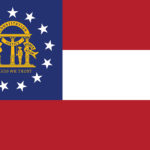 Georgia: A voting rights advocate and longtime city commissioner in Coffee County suffered a loss this week in a federal lawsuit she was pursuing against election officials after she was arrested for helping voters in 2020. Olivia Coley-Pearson is suing the county election board and former election supervisor Emily Misty Martin. Coley-Pearson was an elected commissioner for the city of Douglas in Coffee County when a city policeman arrested her at a polling site during early voting in 2020. Martin had called police on Coley-Pearson, complaining she was causing a disruption while helping voters. Police issued a criminal trespass warning, but Coley-Pearson returned later that day and was arrested. Coley-Pearson had a long history of helping illiterate voters cast their ballots. After the criminal case against her was dismissed in 2022, she sued Martin and the Coffee County Board of Elections, alleging violation of her constitutional rights to free speech and against false arrest. A federal judge in Atlanta ruled against Coley-Pearson in 2023, so she appealed to the Eleventh Circuit Court of Appeals, which ruled against her Tuesday.
Georgia: A voting rights advocate and longtime city commissioner in Coffee County suffered a loss this week in a federal lawsuit she was pursuing against election officials after she was arrested for helping voters in 2020. Olivia Coley-Pearson is suing the county election board and former election supervisor Emily Misty Martin. Coley-Pearson was an elected commissioner for the city of Douglas in Coffee County when a city policeman arrested her at a polling site during early voting in 2020. Martin had called police on Coley-Pearson, complaining she was causing a disruption while helping voters. Police issued a criminal trespass warning, but Coley-Pearson returned later that day and was arrested. Coley-Pearson had a long history of helping illiterate voters cast their ballots. After the criminal case against her was dismissed in 2022, she sued Martin and the Coffee County Board of Elections, alleging violation of her constitutional rights to free speech and against false arrest. A federal judge in Atlanta ruled against Coley-Pearson in 2023, so she appealed to the Eleventh Circuit Court of Appeals, which ruled against her Tuesday.
 Indiana: League of Women Voters of Indiana, Common Cause Indiana, Hoosier Asian American Power and Exodus Refugee Immigration have sued to pause enforcement of Indiana’s recently enacted proof of citizenship efforts, which they allege violate federal voter registration and civil rights laws. The plaintiffs also sought information on the Hoosiers affected. The lawsuit was filed in the U.S. District Court for Indiana’s Southern District. It names Secretary of State Diego Morales as a defendant, along with Indiana Election Division Co-Directors Bradley King and Angela Nussmeyer. “Since July 1, 2025, Indiana has started to enforce laws that rely on stale, error-ridden data and demand that only certain U.S. citizens produce documentary proof of citizenship to register or to remain registered to vote,” the complaint reads. It goes on to allege the requirements “risk disenfranchising eligible Hoosier voters” who are naturalized citizens, or who derived citizenship through their parents’ naturalization. One of the statutes, 2024’s House Enrolled Act 1264, requires designated National Voter Registration Act officials to compare the state voter rolls with an Indiana Bureau of Motor Vehicles database to identify registered voters who hold temporary driver’s licenses or identification cards. The other, 2025’s House Enrolled Act 1680, applies to those who register to vote with temporary credential numbers. Under both laws, county election officials send notices to flagged Hoosiers, who have 30 days to provide proof of citizenship. Otherwise, under the first law, they’re stripped from the voter rolls, and under the second, their registration applications are rejected. The plaintiffs allege the laws violate the NVRA and Civil Rights Act because they discriminate against naturalized and derived citizens. The statutes also demand information that isn’t “equivalent” to federal requirements, they wrote.
Indiana: League of Women Voters of Indiana, Common Cause Indiana, Hoosier Asian American Power and Exodus Refugee Immigration have sued to pause enforcement of Indiana’s recently enacted proof of citizenship efforts, which they allege violate federal voter registration and civil rights laws. The plaintiffs also sought information on the Hoosiers affected. The lawsuit was filed in the U.S. District Court for Indiana’s Southern District. It names Secretary of State Diego Morales as a defendant, along with Indiana Election Division Co-Directors Bradley King and Angela Nussmeyer. “Since July 1, 2025, Indiana has started to enforce laws that rely on stale, error-ridden data and demand that only certain U.S. citizens produce documentary proof of citizenship to register or to remain registered to vote,” the complaint reads. It goes on to allege the requirements “risk disenfranchising eligible Hoosier voters” who are naturalized citizens, or who derived citizenship through their parents’ naturalization. One of the statutes, 2024’s House Enrolled Act 1264, requires designated National Voter Registration Act officials to compare the state voter rolls with an Indiana Bureau of Motor Vehicles database to identify registered voters who hold temporary driver’s licenses or identification cards. The other, 2025’s House Enrolled Act 1680, applies to those who register to vote with temporary credential numbers. Under both laws, county election officials send notices to flagged Hoosiers, who have 30 days to provide proof of citizenship. Otherwise, under the first law, they’re stripped from the voter rolls, and under the second, their registration applications are rejected. The plaintiffs allege the laws violate the NVRA and Civil Rights Act because they discriminate against naturalized and derived citizens. The statutes also demand information that isn’t “equivalent” to federal requirements, they wrote.
 Maryland: Anne Arundel County Circuit Court Judge Pamela K. Alban issued a partial ruling this week in favor of a group of unaffiliated Maryland voters who are challenging the state’s closed primary election system. Alban determined the voters had standing to file their case, but she has yet to decide whether she’ll dismiss the case on other grounds raised by the defendants — or allow it to proceed. She said she will issue a written ruling in the coming days. Alban indicated she was skeptical of the voters’ arguments in their lawsuit that their claims were not resolved by prior case law, but said she planned to continue considering the “nuance” of the law. “I want to think about it a bit more,” Alban said. “I imagine no matter what I do, this may not be the end.” The group of voters in the Maryland suit are challenging the fact that the state government funds primary elections that are not open to all voters, since voters must generally affiliate with the Democratic or Republican party to cast their ballots in primaries — unless it’s a non-partisan race. Their suit names the State Board of Elections and various state officials as defendants. Daniel Kobrin, an assistant attorney general representing the defendants, argued that the case was focused on an alleged “waste of taxpayer money,” and that the plaintiffs didn’t have the standing to sue based on their status as taxpayers. Eric Gunderson, an attorney for the voters, said that the plaintiffs are not arguing that the state shouldn’t fund primaries. Rather, they are arguing that, if the state continues to sponsor those elections, they should be open to all. The political parties could opt to fund their own primary elections if they wished to continue restricting participation, Gunderson said. Alban agreed with him, ruling that the case was an elections matter — not a taxpayer one — and that the five plaintiffs had standing to sue because they are all registered voters in the state.
Maryland: Anne Arundel County Circuit Court Judge Pamela K. Alban issued a partial ruling this week in favor of a group of unaffiliated Maryland voters who are challenging the state’s closed primary election system. Alban determined the voters had standing to file their case, but she has yet to decide whether she’ll dismiss the case on other grounds raised by the defendants — or allow it to proceed. She said she will issue a written ruling in the coming days. Alban indicated she was skeptical of the voters’ arguments in their lawsuit that their claims were not resolved by prior case law, but said she planned to continue considering the “nuance” of the law. “I want to think about it a bit more,” Alban said. “I imagine no matter what I do, this may not be the end.” The group of voters in the Maryland suit are challenging the fact that the state government funds primary elections that are not open to all voters, since voters must generally affiliate with the Democratic or Republican party to cast their ballots in primaries — unless it’s a non-partisan race. Their suit names the State Board of Elections and various state officials as defendants. Daniel Kobrin, an assistant attorney general representing the defendants, argued that the case was focused on an alleged “waste of taxpayer money,” and that the plaintiffs didn’t have the standing to sue based on their status as taxpayers. Eric Gunderson, an attorney for the voters, said that the plaintiffs are not arguing that the state shouldn’t fund primaries. Rather, they are arguing that, if the state continues to sponsor those elections, they should be open to all. The political parties could opt to fund their own primary elections if they wished to continue restricting participation, Gunderson said. Alban agreed with him, ruling that the case was an elections matter — not a taxpayer one — and that the five plaintiffs had standing to sue because they are all registered voters in the state.
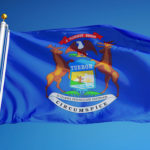 Michigan: Four felony election fraud cases against a Hamtramck City Councilman have been dismissed after two witnesses in the case failed to appear in court this week. Councilman Muhtasin Sadman was accused of forging an absentee ballot and aiding two unqualified electors to vote in the 2023 election. Monroe County Assistant Prosecutor Ragan Lake said the two witnesses did not appear despite being served subpoenas to attend court October 20. Sadman was charged with forging a signature on an absentee ballot, election law forgery, two counts of aiding an unqualified elector in an attempt to vote and making a false statement on an absentee ballot. All are felonies except the making a false statement on an absentee ballot charge, which is a misdemeanor. Judge Alexis Krot in Hamtramck’s 31st District Court set a pretrial date in November to continue with the prosecution of the misdemeanor case.
Michigan: Four felony election fraud cases against a Hamtramck City Councilman have been dismissed after two witnesses in the case failed to appear in court this week. Councilman Muhtasin Sadman was accused of forging an absentee ballot and aiding two unqualified electors to vote in the 2023 election. Monroe County Assistant Prosecutor Ragan Lake said the two witnesses did not appear despite being served subpoenas to attend court October 20. Sadman was charged with forging a signature on an absentee ballot, election law forgery, two counts of aiding an unqualified elector in an attempt to vote and making a false statement on an absentee ballot. All are felonies except the making a false statement on an absentee ballot charge, which is a misdemeanor. Judge Alexis Krot in Hamtramck’s 31st District Court set a pretrial date in November to continue with the prosecution of the misdemeanor case.
Frank Prezzato of St. Clair Shores, who admitted voting twice in the August 2024 primary was sentenced to six months of probation in Macomb County Circuit Court. Prezzato was one of four voters accused in the case in St. Clair Shores. He pleaded guilty Sept. 3 to one count of election law-voting absentee and in person. The Michigan Attorney General’s Office dismissed another charge — offering to vote more than once — at sentencing Oct. 22 before Circuit Judge Anthony Servitto. In addition to probation, Prezzato received credit for one day served in the county jail, according to online court records. According to those records and a prior news release from the attorney general’s office, Prezzato sought to delay sentencing for six months and upon successful completion of probation, the charge to which he entered his plea would be dismissed with prejudice. The delayed sentencing hearing is set for April 15 in the circuit court.
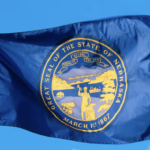 Nebraska: Nebraska Secretary of State Bob Evnen is asking a district court judge to pause a lawsuit over whether he will hand the state’s voter data to the federal government in light of the ongoing federal shutdown. Solicitor General Cody Barnett and the state Attorney General’s Office, on behalf of Evnen in a motion, asked that the case be delayed so Evnen could continue discussions with the U.S. Department of Justice over how voter privacy would be protected. Negotiations had to pause because of the ongoing federal shutdown since Sept. 30. The motion states that without federal funding, Justice Department attorneys can’t work, even on a voluntary basis. It asks to pause the case until Evnen can reopen discussions, but to resume it no more than 60 days after the shutdown ends. “It is in the interest of judicial economy and conducive to an efficient resolution of this matter that this agreement be completed and available for production before the next stages of litigation,” the motion states. Evnen anticipates the discussions “will yield an agreement that will impact the arguments made in this case,” according to the motion. That could mean getting in writing how the privacy of the voter information — names, dates of birth, driver’s license numbers and the last four digits of voters’ Social Security numbers — would be protected. The motion also confirms that Evnen will not send the requested voter data to the federal government during the course of the lawsuit.
Nebraska: Nebraska Secretary of State Bob Evnen is asking a district court judge to pause a lawsuit over whether he will hand the state’s voter data to the federal government in light of the ongoing federal shutdown. Solicitor General Cody Barnett and the state Attorney General’s Office, on behalf of Evnen in a motion, asked that the case be delayed so Evnen could continue discussions with the U.S. Department of Justice over how voter privacy would be protected. Negotiations had to pause because of the ongoing federal shutdown since Sept. 30. The motion states that without federal funding, Justice Department attorneys can’t work, even on a voluntary basis. It asks to pause the case until Evnen can reopen discussions, but to resume it no more than 60 days after the shutdown ends. “It is in the interest of judicial economy and conducive to an efficient resolution of this matter that this agreement be completed and available for production before the next stages of litigation,” the motion states. Evnen anticipates the discussions “will yield an agreement that will impact the arguments made in this case,” according to the motion. That could mean getting in writing how the privacy of the voter information — names, dates of birth, driver’s license numbers and the last four digits of voters’ Social Security numbers — would be protected. The motion also confirms that Evnen will not send the requested voter data to the federal government during the course of the lawsuit.
 New Hampshire: Grace Gato, 44, of Hudson, a journalist, aspiring filmmaker, and progressive Democrat activist, was charged earlier this month with a misdemeanor count of wrongful voting after an investigation into a claim she attempted to obtain a ballot for her dead mother in October 2024, after a town clerk employee contacted the Election Law Unit of the department of justice. The clerk also received an anonymous letter accusing Gato of potentially attempting to vote for her deceased mother. Gato, according to an email to Patch and an affidavit, was caregiver for her mother, Ruby Ponce, who died on Oct. 15, 2024. Eight days after her mother’s passing, Gato went to the town clerk’s office to obtain an absentee ballot for her mother on Oct. 21, 2024, an affidavit said. She submitted the ballot application and signed an attestation saying she was assisting her mother because she had a disability, the report said. The affidavit said there was probable cause for two charges against Galo: One for wrongful voting; penalties for voter fraud and applying for an absentee ballot in a name other than her own. The attorney general’s office is pursuing one count.
New Hampshire: Grace Gato, 44, of Hudson, a journalist, aspiring filmmaker, and progressive Democrat activist, was charged earlier this month with a misdemeanor count of wrongful voting after an investigation into a claim she attempted to obtain a ballot for her dead mother in October 2024, after a town clerk employee contacted the Election Law Unit of the department of justice. The clerk also received an anonymous letter accusing Gato of potentially attempting to vote for her deceased mother. Gato, according to an email to Patch and an affidavit, was caregiver for her mother, Ruby Ponce, who died on Oct. 15, 2024. Eight days after her mother’s passing, Gato went to the town clerk’s office to obtain an absentee ballot for her mother on Oct. 21, 2024, an affidavit said. She submitted the ballot application and signed an attestation saying she was assisting her mother because she had a disability, the report said. The affidavit said there was probable cause for two charges against Galo: One for wrongful voting; penalties for voter fraud and applying for an absentee ballot in a name other than her own. The attorney general’s office is pursuing one count.
 New Jersey: Gloucester County is being forced into a quick redesign of its 2025 election ballot. On Oct. 10, a state appellate division court said the format the county clerk’s office used was in clear violation of New Jersey law. This ruling came as result of a lawsuit filed by members of the Gloucester County GOP committee, plus county commissioner candidates Jonathan M. Sammons and Byron Driscoll. The decision also reverses the greater part of a county Superior Court order issued Oct. 7 in the case. Attorneys Josiah Contarino of Newark and Marla DeMarcantonio of Woodbury represented the plaintiffs. The defendants were County Clerk James N. Hogan, Deputy County Clerk Heather Pool, county Elections Superintendent Stephanie Salvatore and members of the county’s board of elections. “I just wanted to first say — we’re happy with this result,” Contarino said Thursday, Oct. 16. “We think it’s showing that voting done in accordance with the governing law is important, not just for election integrity but also voter confidence.” County residents who vote in person, including those using early voting opportunities, are to be presented with an amended ballot. Sample ballots, which are to be mailed out soon, are also to be revised.
New Jersey: Gloucester County is being forced into a quick redesign of its 2025 election ballot. On Oct. 10, a state appellate division court said the format the county clerk’s office used was in clear violation of New Jersey law. This ruling came as result of a lawsuit filed by members of the Gloucester County GOP committee, plus county commissioner candidates Jonathan M. Sammons and Byron Driscoll. The decision also reverses the greater part of a county Superior Court order issued Oct. 7 in the case. Attorneys Josiah Contarino of Newark and Marla DeMarcantonio of Woodbury represented the plaintiffs. The defendants were County Clerk James N. Hogan, Deputy County Clerk Heather Pool, county Elections Superintendent Stephanie Salvatore and members of the county’s board of elections. “I just wanted to first say — we’re happy with this result,” Contarino said Thursday, Oct. 16. “We think it’s showing that voting done in accordance with the governing law is important, not just for election integrity but also voter confidence.” County residents who vote in person, including those using early voting opportunities, are to be presented with an amended ballot. Sample ballots, which are to be mailed out soon, are also to be revised.
 New York: The New York state Court of Appeals unanimously ruled last week that a new state law that will move most local elections to even-numbered years to align with state and federal races is constitutional. The ruling by the seven justices on the state’s highest court puts an end to a lengthy legal battle over a law New York Democrats adopted in 2023 that moves most town and county races outside of New York City to even-numbered years to coincide with races for Congress, governor or president. The change excludes villages and races for county clerk, sheriff, district attorneys, local judges and others protected under the state Constitution. “The Court of Appeals’ unanimous decision to uphold New York’s even-year election law is a victory for democracy and all New Yorkers,” Gov. Kathy Hochul said in a statement. “I championed this legislation because I believe our state is stronger when more people have the opportunity to make their voices heard. By aligning local elections with the state and federal calendar, we’re making it easier for New Yorkers to participate in government. At a time when voting rights are under attack across the nation, New York is proudly moving in the opposite direction.” The decision ends a longstanding legal challenge spearheaded by Republican leaders in Onondaga County, who argued the change erodes the power of local governments and it conflicts with individual county charters.
New York: The New York state Court of Appeals unanimously ruled last week that a new state law that will move most local elections to even-numbered years to align with state and federal races is constitutional. The ruling by the seven justices on the state’s highest court puts an end to a lengthy legal battle over a law New York Democrats adopted in 2023 that moves most town and county races outside of New York City to even-numbered years to coincide with races for Congress, governor or president. The change excludes villages and races for county clerk, sheriff, district attorneys, local judges and others protected under the state Constitution. “The Court of Appeals’ unanimous decision to uphold New York’s even-year election law is a victory for democracy and all New Yorkers,” Gov. Kathy Hochul said in a statement. “I championed this legislation because I believe our state is stronger when more people have the opportunity to make their voices heard. By aligning local elections with the state and federal calendar, we’re making it easier for New Yorkers to participate in government. At a time when voting rights are under attack across the nation, New York is proudly moving in the opposite direction.” The decision ends a longstanding legal challenge spearheaded by Republican leaders in Onondaga County, who argued the change erodes the power of local governments and it conflicts with individual county charters.
 U.S. Virgin Islands: A civil lawsuit seeking to remove V.I. Board of Elections Chairman Raymond Williams from the board and halt its meetings was dismissed after Superior Court Judge Alphonso G. Andrews, Jr. rejected a request for a temporary restraining order and found the plaintiffs had not presented evidence to support their allegations of illegality, fraud, or conflict of interest. The case was brought by board members Lawrence Boschulte, Harriet Mercer, and Atanya Springette, along with Collister Fahie, who represented the group pro se. The plaintiffs asked the court to remove Williams from his position and from the board, claiming the Board of Elections had met without a quorum and that Williams’s roles as board chair, executive director of the V.I. Lottery, and a commissioner on the V.I. Public Services Commission created a conflict of interest. They also alleged “illegal activities,” fraud, and constitutional violations. Andrews dismissed all counts, concluding the plaintiffs failed to substantiate their claims. He noted that no documentary evidence supported the wide-ranging accusations; plaintiffs relied on witness statements that did not establish the alleged wrongdoing.
U.S. Virgin Islands: A civil lawsuit seeking to remove V.I. Board of Elections Chairman Raymond Williams from the board and halt its meetings was dismissed after Superior Court Judge Alphonso G. Andrews, Jr. rejected a request for a temporary restraining order and found the plaintiffs had not presented evidence to support their allegations of illegality, fraud, or conflict of interest. The case was brought by board members Lawrence Boschulte, Harriet Mercer, and Atanya Springette, along with Collister Fahie, who represented the group pro se. The plaintiffs asked the court to remove Williams from his position and from the board, claiming the Board of Elections had met without a quorum and that Williams’s roles as board chair, executive director of the V.I. Lottery, and a commissioner on the V.I. Public Services Commission created a conflict of interest. They also alleged “illegal activities,” fraud, and constitutional violations. Andrews dismissed all counts, concluding the plaintiffs failed to substantiate their claims. He noted that no documentary evidence supported the wide-ranging accusations; plaintiffs relied on witness statements that did not establish the alleged wrongdoing.
 Wisconsin: The Wisconsin Elections Commission appealed a Waukesha County Judge Michael Maxwell’s order requiring election officials to verify the citizenship of all registered voters and people seeking to register. According to Votebeat, attorneys for the Wisconsin Department of Justice wrote that the Waukesha County Circuit Court decision was “impermissively vague” and would require election officials to disregard multiple voter registration laws. The appeal follows a request for a stay, filed last week, in which the attorneys told the court it would be virtually impossible for the election commission to implement Maxwell’s decision by the February statewide election, and that it would illegally have to shut down online voter registration in the meantime. In response, Maxwell stayed the part of his ruling that required citizenship verification for new registrants, but let stand the part requiring the Wisconsin Elections Commission to verify the citizenship of all currently registered voters.
Wisconsin: The Wisconsin Elections Commission appealed a Waukesha County Judge Michael Maxwell’s order requiring election officials to verify the citizenship of all registered voters and people seeking to register. According to Votebeat, attorneys for the Wisconsin Department of Justice wrote that the Waukesha County Circuit Court decision was “impermissively vague” and would require election officials to disregard multiple voter registration laws. The appeal follows a request for a stay, filed last week, in which the attorneys told the court it would be virtually impossible for the election commission to implement Maxwell’s decision by the February statewide election, and that it would illegally have to shut down online voter registration in the meantime. In response, Maxwell stayed the part of his ruling that required citizenship verification for new registrants, but let stand the part requiring the Wisconsin Elections Commission to verify the citizenship of all currently registered voters.
Opinions This Week
National Opinions: Voting Rights Act, II, III, IV, V, VI, VII, VIII | Election process | U.S. Supreme Court, II | Federal forces
Georgia: Secretary of state
Maine: Voter ID | Absentee voting
Mississippi: Voting Rights Act
Nevada: Cybersecurity | Vote by mail
Pennsylvania: Language access
Utah: Trust in elections
Upcoming Events
America Exposed: Politicization and Its Impact on Cybersecurity: Long a bastion of bipartisanship, American cybersecurity is under new strain as lawmakers continue to move further away from compromise. Join Issue One’s panel of cyber security experts as we discuss Issue One’s latest report and hear how partisanship is hamstringing our response to foreign cyber threats. We will hear a first hand example with a short exploration of Congress’ failure to reauthorize the Cyber Infrastructure Security Act of 2015 and the urgent need for a full 10-year reauthorization. Panelists include: Kim Wyman: Former Washington Secretary of State and Senior Election Security Advisor at CISA and current President of Election Security & Innovation Consulting; Patrick J. Murphy: Executive Director at Hilco Global’s Geopolitical Advisory Unit, former Under Secretary of the Army, and the first Iraq War veteran elected to Congress and Laura Edelson: Former Chief Technologist at DoJ and current Co-director of Cybersecurity for Democracy. When: October 24, 9am Eastern. Where: Online.
Everyday Democracy: Please join New America’s Political Reform Program, New America’s Education Policy Program, Philanthropy for Active Civic Engagement (PACE), Campus Compact, and Democracy Notes on Oct 24, 2025 from 10am-12pm for a dynamic, in-person event with civic leaders from across the country. The program will feature back-to-back fireside chats with experts who are advancing participatory governance in communities around the United States. From local democracy forums to grassroots coalitions, panelists will discuss how they are building trust, collectively solving everyday problems, and strengthening civic life at the local level. This interactive conversation will bring together practitioners from inside and outside government who are reimagining how residents and institutions work together. We will explore how culture—our shared norms, stories, and ways of engaging—shapes the practice of democracy, and why that matters more than ever in an era of national polarization and fractured federal infrastructure. Participants will gain insights into innovative approaches that foster belonging, bridge divides, and widen civic participation in decision-making. Whether through public assemblies, co-governance models, or creative community-building, these leaders are showing how democratic culture can be sustained and renewed from the ground up. When: October 24. Where: Washington, DC.
Symposium at Auburn University: The 5th Biennial Auburn Symposium in Election Administration will be held October 26-28, 2025 at the Hotel at Auburn University. The Symposium launched in 2015 to foster conversation about critical issues that impact American democratic institutions, support the development of common understanding and language across diverse professional communities engaged in the practice of election administration, and promote dialogue between those who conduct elections and those who study the way elections operate. The series is held in odd-numbered years on the Auburn University campus. This year, the theme is Innovative Election Administration Funding Solutions, exploring new, practical, and sustainable solutions to address the critical issue of adequate funding of election administration across local, state, and/or federal levels in the United States. Questions: elect1@auburn.edu. When: October 26-28. Where: Auburn, Alabama.
NDACo Annual Conference [North Dakota]: When: October 26-28.
Media, Social Media, and the Changing Election Information Environment in 2026: The Safeguarding Democracy Project at UCLA Law promotes research, collaboration, and advocacy aimed at ensuring continued free and fair elections in the United States. This webinar will be moderated by Rick Hasen and feature: Danielle Citron, UVA Law, Brendan Nyhan, Dartmouth, and Amy Wilentz, UCI Emerita. When: October 30, 3:15pm Eastern. Where: Online.
Election Hero Day: Election Hero Day is a nonpartisan, national celebration recognizing the tremendous contributions that election officials, their staff, and poll workers make to ensure a safe, secure voting experience for all Americans. Taking place on November 3, 2025, nonprofits, business leaders, brands, public officials, and more will unite to honor the election heroes in our communities. With your support, Election Hero Day will help boost election official morale ahead of Election Day and send a clear message to the public that we support our friends and neighbors who play such a vital role in preserving our democracy. When: November 3.
2025 National Student Vote Summit– The Students Learn Students Vote Coalition is proud to host the 10th annual National Student Vote Summit. At the summit, we’ll unite nonprofit leaders, campus staff, administrators, faculty members, philanthropic partners, election officials, and students from across the country to continue a decade-strong tradition of collective action and impact. Building on the momentum and insights from our 2024 Summit—where more than 300 nonpartisan student vote leaders took on challenges like local election turnout, combating misinformation, and reducing post-election disengagement — this milestone gathering aims to amplify our collective power and chart a course for an even more impactful 2026. We’ll kick off the Summit with the ALL IN Campus Democracy Challenge Awards Ceremony, celebrating college student voting achievements nationwide and setting the stage for a memorable experience. Awards will be presented to college and university campuses, student leaders and individual champions for their nonpartisan contributions to increasing student voter engagement in the 2024 Election. Thanks to our incredible host partners at the University of Maryland, College Park, we’ll gather once again at UMD’s Stamp Student Union. There, in collaboration with TerpsVote, we’ll create an inspiring space for learning, connection, and celebration. Every participant will leave equipped with the tools, relationships, and momentum to make 2026 a historic year for nonpartisan student voter engagement. When: November 12-15. Where: College Park, Maryland.
57th Annual Tennessee County Officials Association (COAT) Conference: When: November 16-19. Where: Pigeon Forge.
The Supreme Court, the Voting Rights Act, and the 2026 Elections: The Safeguarding Democracy Project at UCLA Law promotes research, collaboration, and advocacy aimed at ensuring continued free and fair elections in the United States. This webinar will be moderated by Rick Hasen and feature: Ellen Katz, University of Michigan, Lenny Powell, Native American Rights Fund (NARF), and Deuel Ross, Legal Defense Fund. When: November 18, 3:15pm Eastern. Where: Online.
The Fragile Republic: Lessons on Political Violence from the Founding to Today: As America approaches its 250th anniversary, political violence once again tests the strength of our democratic institutions and civic culture. What can we learn from the early republic’s own battles with factionalism and unrest, and how can those lessons guide us today? Join the R Street Institute for a thought-provoking conversation with an exceptional panel of historians, journalists, and policy leaders. Together, they will explore how the founders confronted political violence, how those challenges echo in today’s polarized environment, and what practical steps can help strengthen democratic norms and protect civic life for the next 250 years. Featuring: [Moderator] Sabrina Schaeffer, Vice President, Public Affairs, R Street Institute, [Moderator] Lisel Petis, Policy Director, Criminal Justice and Civil Liberties, R Street Institute, Greg Lukianoff, President and CEO, Foundation for Individual Rights and Expression, Peter Savodnik, Senior Editor, The Free Press, Noah Rothman, Senior Writer, National Review, and Joanne B. Freeman, Professor of History and American Studies, Yale University When: November 19, 3pm Eastern. Where: Online.
2025 New England Association of City and Town Clerks Conference: When: November 19-21. Where: Bangor, Maine.
JEOLC 2026: The Election Center will host the 2026 JEOLC conference at the Ritz Carlton in Pentagon City, Virginia from January 6-10. One CERA renewal class will be offered. Please visit the Election Center website for more information and to register when it’s available.
iGO Midwinter Conference: The International Association of Government Officials will hold its Midwinter Conference in Albuquerque, New Mexico from January 19-23, 2026. Please visit the iGO website for more information and to register.
2026 NASS Winter Conference: The National Association of Secretaries of State will hold its 2026 Winter Conference in Washington, DC from January 28-31. Please refer to the NASS website for more information about the event and to register.
2026 NASED Winter Conference: Twice a year, National Association of State Election Directors members gather to discuss the latest developments in election administration. Members of the public are welcome to attend at the non-member registration rate. Please refer to the NASED website for information about the 2026 Winter Conference. When: Feb. 1-3, 2026. Where: Washington, DC.
2026 NACo Legislative Conference: The National Association of Counties will hold its 2026 Legislative Conference in Washington, DC from February 21-24, 2026. Please visit the NACo website for more information about the event and to register.
Election Center February Workshop: Focusing on interaction and sharing of practices selected by members to receive People’s Choice Awards, the February Workshops formalize those critical conversations that happen at conferences during meals, in the hallways, & the hotel lobby. The agenda augments the award-winning member presentations with applicable research and resources.Two CERA core courses and one renewal will be held following the workshop. When: February 25-27. Where: Jacksonville, Florida.
Job Postings This Week
electionlineWeekly publishes election administration job postings each week as a free service to our readers. To have your job listed in the newsletter, please send a copy of the job description, including a web link to mmoretti@electionline.org. Job postings must be received by 5pm on Wednesday in order to appear in the Thursday newsletter. Listings will run for three weeks or till the deadline listed in the posting.
Administrative Specialist, King County, Washington – The Department of Elections is searching for energetic and resourceful professionals who like to “get stuff done”. The Administrative Specialist II positions in the Voter Services Department combines an exciting, fast-paced environment with the opportunity to cultivate talents and apply a variety of skills. The ideal candidate will have a desire to help ensure the democratic process through public service. They will thrive in an innovative environment and will not hesitate to roll up both sleeves, work hard, have fun, and get the job done. Job Duties: Provide excellent customer service to internal and external customers in person, via telephone, and via e-mail by processing voter registrations, communicating election program information and explaining election procedures, guidelines and regulations. Provide backup support for translation and/or interpreting and proof election-related documents and web materials from English to Chinese (traditional text). This includes but is not limited to voter registration information, letters, and other correspondence, notice of elections, ballot titles, voters’ pamphlet information, candidate statements, ballot measures, etc. to limited English speaking (LES) voters. Perform production-level computer work which includes accurate data entry, retrieving and editing records. Organize and coordinate work activities and assist with providing training and one-on-one instruction to diverse staff. Set up records and file documents in both electronic and paper formats. Review documents for proper format, accuracy, completion, eligibility, and other legal guidelines. Audit work group data entry activities to ensure performance quality and efficiency of work. Utilize spreadsheets, word documents and reports to track and document performance data. Research and resolve questions from staff, citizens and stakeholders. Document and improve work processes, procedures and instructions. Salary: $27.03 – $34.40 Hourly. Application: For the complete job listing and to apply, click here.
Assistant Registrar of Voters, Santa Clara County, California– Under general direction, the Assistant Registrar of Voters supports the planning, organization, and oversight of the County Registrar of Voters Department. This executive leadership position reports directly to the Registrar of Voters and plays a key role in administering and managing departmental operations. The department is responsible for voter registration, the conduct of elections, and related electoral services. The Assistant Registrar of Voters helps ensure that all activities are carried out efficiently, accurately, and in compliance with applicable laws and regulations. This position may assume the responsibility of the Department in the absence of the Registrar of Voters. Salary: $194,184.52 – $249,180.63. Application: For the complete job listing and to apply, click here.
Ballot Processing Supervisor, King County, Washington– This is an amazing opportunity to be engaged in the election process! The Department of Elections is searching for energetic and resourceful professionals who like to “get stuff done”. The Ballot Processing Supervisor position in the Elections Department combines an exciting, fast paced environment with the opportunity to cultivate talents and apply a variety of skills. The ideal candidate will thrive in an innovative and fast-paced environment and will not hesitate to roll up both sleeves, work hard, have fun, and get the job done. This position reports to the Ballot Processing Manager and provides support for the Ballot Processing program, including Incoming Ballot Sort, Alternate Format Ballot Processing, Signature Verification and Envelope Review. The person in this role will supervise between 4 full-time staff and up to 70 temporary staff depending on the size of the election. Salary: $40.24 – $51.01 Hourly. Deadline: November 12. Application: For the complete job listing and to apply, click here.
Deputy Director, Surrey County, North Carolina– The County of Surry is accepting applications for the full-time position of Deputy Director of Elections. This position assists the Elections Director with managing the daily operations of the Board of Elections office and with the preparation and conduct of elections in accordance with federal, state, and local laws. The Deputy Director also serves as Acting Director in the Director’s absence. Key responsibilities include planning, preparing, and conducting all elections; supporting candidate filing, ballot preparation, absentee and early voting, and election-day logistics; overseeing the testing, maintenance, and certification of voting equipment; assisting with reconciliation and post-election reporting; maintaining the voter registration database and conducting list maintenance; supervising and training precinct officials; coordinating polling places and election supplies; preparing training materials and forms; and ensuring compliance with election laws and security protocols. The position also requires excellent customer service to voters, candidates, political parties, and the public, along with representing the department at trainings and community events. Other duties may be assigned as needed. Salary: $41,508 – $69,124. Application For the complete job listing and to apply, click here.
Deputy of Elections, Yolo County, California– Under administrative direction of the Assessor/Clerk-Recorder/Registrar of Voters, the Deputy of Elections assists the Assessor/Clerk-Recorder/Registrar of Voters in the planning, administration, direction, and coordination of the Elections Branch; develops and implements program policy, procedures, and strategic initiatives; oversees major program areas and ensures compliance with applicable laws and regulations; assists the Assessor/Clerk-Recorder/Registrar of Voters with the administration and direction of the department; and may serve as an Assessor/Clerk-Recorder/Registrar of Voters designee or in their absence. An ideal candidate is a highly adaptable and meticulous elections professional with proven leadership experience navigating the rapid pace and strict deadlines of election administration. They possess strong technical skills and a proactive approach to problem-solving, ensuring the accurate and timely execution of all election-related duties. In addition, the following knowledge and abilities are associated with this position. Salary: $111,321.60 – $135,304.00 Annually. Application: For the complete job listing and to apply, click here.
Election Operations & Workforce Manager, Charleston County, South Carolina– The Board of Voter Registration and Elections is an award-winning organization dedicated to excellence in electoral processes. Our mission is to daily serve the Charleston County voting constituency with Vigilance, Objectivity, and Transparency in a manner that promotes due diligence Excellence in all aspects of Elections Management. We are committed to continuous improvement, innovative practices, and exceptional service to our community, ensuring every voter’s voice is heard. Are you driven by a passion for democracy and civic engagement? Join the Board of Voter Registration and Elections as the Election Operations and Workforce Manager and play a critical role in delivering seamless, fair, and accessible elections. Key Responsibilities: Poll Worker Recruitment and Management; Polling Location Management; Liaison and Community Engagement; Support for Election Operations on Election Day and Early Voting; and Team Leadership. Salary: $68,140 – $89,252. Application: For the complete job listing and to apply, click here.
Elections Clerical Unit Supervisor (Operations Supervisor), Multnomah County, Oregon– In the Department of Community Services at Multnomah County, we look for people who can grow, think, lead, and inspire. We have a culture that thrives on diversity and rewards commitment to public service. We seek leaders, achievers and doers who bring skill and passion to a challenging and evolving environment. If you’re passionate about being involved in a position that creates a positive impact in your community with the ability to act ethically, respecting, valuing, and honoring our unique voices within the community, this is the job for you. Are you interested in joining our team to carry out this special mission? Be a part of a calling that impacts our community on a completely different level than you have ever experienced before as a team lead. Multnomah County’s Elections Division is currently looking for an experienced, self-motivated, and organized Elections Clerical Unit Supervisor to fill one (1) full-time vacancy at its Elections Office in SE Portland, Oregon. As part of our elections leadership team, you will provide support of the daily operations of the Elections Division team and assist with the implementation of elections program goals and objectives, including quality and performance improvement activities in the Clerical / Voter Registration Unit. To be successful in this role, you must feel comfortable in a busy and sometimes unpredictable environment. You embody professionalism and model our values to our community members and fellow employees. You’re knowledgeable about the elections process and supervision and keep up to date with current best practices. You lead your team collaboratively and set the example for your team, jumping in when work needs to get done and finding solutions to create and maintain a high level of care and customer service. Salary: $70,016.75 – $105,025.85 Annual. Deadline: November 9. Application: For the complete job listing and to apply, click here.
Elections Operation Manager, Multnomah County, Oregon– In the Department of Community Services at Multnomah County, we look for people who can grow, think, lead, and inspire. We have a culture that thrives on diversity and rewards commitment to public service. We seek leaders, achievers and doers who bring skill and passion to a challenging and evolving environment. If you’re passionate about being involved in a position that creates a positive impact in your community with the ability to act ethically, respecting, valuing, and honoring our unique voices within the community, this is the job for you. Are you interested in joining our team to carry out this special mission? Be a part of a calling that impacts our community on a completely different level than you have ever experienced before as a team lead. Multnomah County’s Elections Division is currently looking for an experienced, self-motivated, and organized Elections Operations Manager to fill one (1) full-time vacancy at its Elections Office in SE Portland, Oregon. As part of our elections leadership team, you will provide support of the daily operations of the Elections Division team and assist with the implementation of elections program goals and objectives, including quality and performance improvement activities in the Elections Division. To be successful in this role, you must feel comfortable in a busy and sometimes unpredictable environment. You embody professionalism and model our values to our community members and fellow employees. You’re knowledgeable about the elections process and operations and keep up to date with current best practices. You lead your team collaboratively and set the example for your team, jumping in when work needs to get done and finding solutions to create and maintain a high level of care and customer service. Salary: $91,778.29 – $137,666.25 Annual. Deadline: November. 9. Application: For the complete job listing and to apply, click here.
Elections Technology & Systems Manager, Dallas County, Texas–Manages and oversees elections technology projects and systems to ensure security, quality control and efficiency; facilitates the development of each project to meet customer needs. Plans and implements enterprise information systems to support elections operations. Manages staff to establish workload priorities; coordinates projects and reporting of activities while maintaining workflow estimates. Facilitates communication between staff, management, vendors, and other technology resources within the organization and with outside stakeholders. Provides project management oversight for key initiatives and division-level responsibilities. Manages the division budget expenditures and related administrative tasks. Plans, directs, and monitors the development, installation and maintenance of computer programs and associated computer operations necessary to achieve functional departmental systems. Develops the design specifications of computer systems, programs and operating systems, with the following core competencies: Security Analysis, Design, Business Process Improvement, Data, Modeling, Development, Planning, Implementation, Test Script Development, Monitoring/Controls, Troubleshooting/Problem Solving, Documentation and Service Motivation. Collaborates with the Chief Information Officer, Information Security Officer, IT Operations, IT Applications and PMO to ensure best-in-class procedures and security standards for the security of all election-related and departmental records, information and established IT programs. Manages and/or assists in the resolution of highly complex or unusual business problems that cross various IT disciplines and agency boundaries. Develops and establishes department standards and procedures, including application development, quality assurance, incident management, documentation and project management. Evaluates, plans, reviews, and recommends long-range enhancements for computer hardware, software and data communications equipment. Performs other duties as assigned. Salary: $7578-$9459. Deadline: November 5. Application: For the complete job listing and to apply, click here.
Legislative Director, Finance, Pensions & Intergovernmental Affairs (FPIGA), NACo – We are seeking a highly motivated individual to serve as the Legislative Director for Finance, Pensions and Intergovernmental Affairs (FPIGA). This position also serves as NACo’s liaison to the Local Government Legal Center (LGLC). This position is responsible for developing and executing advocacy strategies, analyzing legislation and regulations, and engaging with federal officials and member counties on a portfolio including tax, finance, municipal bonds, public pensions, intergovernmental relations, and local governance legal issues. The Legislative Director will ensure counties have a strong voice in key federal fiscal and intergovernmental decisions and lead NACo’s engagement in legal advocacy through the LGLC. Salary: $100,000-$110,000. Application: For the complete job listing and to apply, click here.
Operations Manager, Dallas County, Texas–Supervises and coordinates elections operations. Develops project plans in MS Project or similar project management tool. Coordinates project tasks with other department staff or stakeholders. Performs statistical analysis and projections to determine the quantities of resources needed for the election. Coordinates project resources for operational teams. Supervises and monitors the execution of the plans developed for operational teams. Reports status and progress of the division’s tasks in the project as requested. Ensures compliance with applicable policies. Supervises staff work to ensure compliance; provides guidance to staff and develops and uses metrics to ensure proper execution of work. Reports to the Elections Administrator and Deputy Elections Administrator on the compliance of the team members with the established procedures. Maintains an accurate and up to date inventory of the assets managed by the team. Manages staff of the Operations Division. Establishes goals for employees. Supervises employees’ time, attendance and compliance with departmental polices (i.e. dress code). Writes performance evaluations and recommendations for developing staff. Provides corrective action as necessary. Develops and maintains standard operating procedures. Writes and reviews documents. Maintains and updates documents by incorporating changes, including but not limited to, any of the following: election laws, county policies, lessons learned from projects, technology used, IT requirements, etc. Develops and monitors the budget for the division. Determines the budgetary needs of the division and creates the budget request for each fiscal year. Ensures compliance by monitoring expenses throughout the year. Reports any deviations to the Executive team. Performs other duties as assigned. Salary: $6356-$7934. Deadline: November 5. Application: For the complete job listing and to apply, click here.
Organizer, Minnesota– We are looking for a creative and collaborative Organizer to join the Common Cause team in Minnesota. This is a key role supporting our organizing and outreach programs and promoting civic engagement across the state. This is a full-time role reporting to the Executive Director, Minnesota and is based in Minnesota, with a preference for candidates located in Olmsted County or St. Cloud, with an expectation to travel around Minnesota at least 2 days per week, with a maximum of 5 days a calendar week during the legislative session, and peak summer engagement season. This is a termed position, starting on November 1, 2025 and ending October 31, 2027. Salary: $63,860 – $80,340 a year. Application: For the complete job listing and to apply, click here.
Registrar of Voters, San Diego County– To provide eligible citizens of San Diego County with widespread and ongoing opportunities to register and vote in fair and accurate elections for all Federal, State, and local offices and measures; to provide access to the information needed to utilize the initiative, referendum, and recall petition processes; and to perform related duties. This is a one-position executive management level classification reporting directly to the Deputy Chief Administrative Officer. The Director oversees and acts as the appointing authority for the department and is responsible for the management of the overall activities of the department, including formulating and administering Countywide policy. Salary: $183,310 – $297,523. Deadline: November 12. Application: For the complete job listing and to apply, click here.
Remote Sales Director, SOE Software– SOE Software is seeking a driven Sales Director to expand our modernization and transparency solutions for state and local governments. In this full-cycle sales role, you’ll own the process from lead generation through contract signing. You’ll represent SOE at conferences and events, confidently starting conversations and building lasting relationships with government officials. By connecting our technology to outcomes like transparency, accessibility, and public trust, you’ll help election offices and public agencies better serve their communities. Application: For the complete job listing and to apply, click here.
Senior Organizer, Colorado, Common Cause– We are seeking a proactive, collaborative, English and Spanish-speaking Senior Organizer to join the Common Cause team in Colorado. In 2025, Common Cause successfully led an effort to pass the nation’s 8th state-level Voting Rights Act. The Colorado Voting Rights Act protects Colorado from threats to dismantle the federal Voting Rights Act of 1965 and creates stronger protection against voter discrimination. The Colorado Senior Organizer will be critical in driving public education and voter outreach efforts around the new law and executing nonpartisan voter protection efforts in 2026. This is a full-time, fixed-term position for a period of 12 months, from November 15, 2025, to November 15, 2026. The role reports to the State Director and is based in Colorado with a preference for this individual to work out of our Denver office at least 1 day per week. They will also travel to communities across the state on a frequent basis, with the possibility of occasional overnight travel. Salary: $72,100 – $89,610 a year. Application: For the complete job listing and to apply, click here.
Senior Policy Analyst, Elections Project, Bipartisan Policy Center– BPC is currently seeking a Senior Policy Analyst to support the work of the Elections Project, which is housed within BPC’s Democracy Program. The Elections Project develops and advances durable bipartisan policy solutions to create secure, accessible, and trustworthy elections. We envision broad public trust in election outcomes where election administration is fully funded and continually improved with the input of election practitioners. Our work is guided by the idea that election policy must be resilient to shifting political winds and crafted with the input of election officials. The Senior Policy Analyst will play a central role in the development and implementation of the Election Project’s research and advocacy priorities. This analyst role will focus on existing priorities of the Elections Project, including election administration workforce (recruitment, retention, and training), election infrastructure and technology, and supporting the needs of local election official associations. The analyst will also have the flexibility to explore research topics of their choice if those topics are in alignment with the needs of the project and of BPC. Salary: $70,000 – $95,000. Application: For the complete job listing and to apply, click here.
Training Program Manager, Charleston County, South Carolina– Democracy works best when every election runs flawlessly—and that starts with exceptional training. As Training Manager for the Board of Voter Registration and Elections, you’ll empower our poll managers and staff to deliver elections that are fair, accessible, and trusted by every voter in Charleston County. The Board of Voter Registration and Elections is an award-winning organization dedicated to excellence in electoral processes. Our mission is to daily serve the Charleston County voting constituency with Vigilance, Objectivity, and Transparency in a manner that promotes due diligence Excellence in all aspects of Elections Management. We believe that people are the foundation of successful elections. That’s why training is not just a task—it’s a core function of our mission. When our teams are prepared, voters can be confident that their voice will be heard, and their ballot counted. As Training Manager, you are not simply teaching procedures—you are building trust in the democratic process. You will design and deliver training that helps every poll manager, staff member, and Board member understand the importance of their role, perform it with confidence, and meet the highest standards of service to our voters. Salary: $68,140.00 – $82,000.00 Annually. Application: For the complete job listing and to apply, click here.
Marketplace
electionline provides no guarantees as to the quality of the items being sold and the accuracy of the information provided about the sale items in the Marketplace. Ads are provided directly by sellers and are not verified by electionline. If you have an ad for Marketplace, please email it to: mmoretti@electionline.org